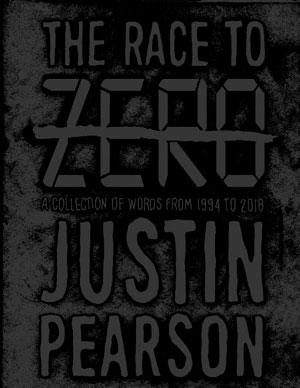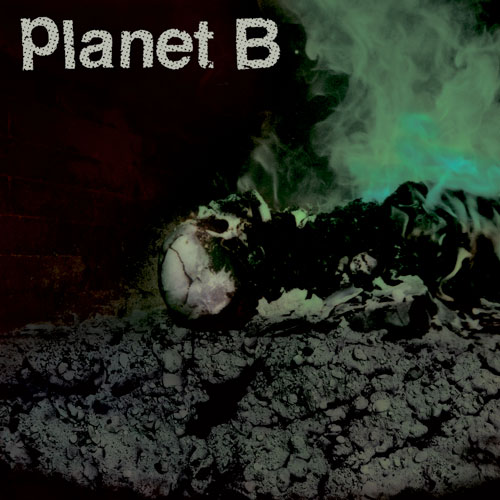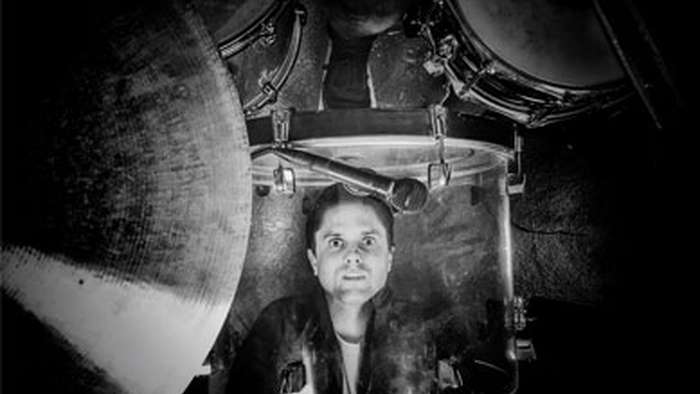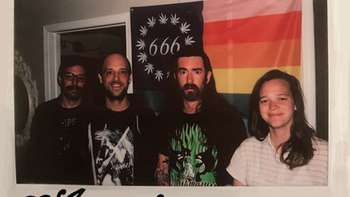The genesis of San Diego-based Three One G is a personal one for the head of its operations, Justin Pearson. The history of Three One G is illuminated by the bands, the members, and anyone else whose work contributed to the development of Three One G. If it sounds like a family; in some ways it is.
In addition to his work at Three One G, Justin Pearson is the vocalist in several bands on the Three One G roster. He plays bass in others, and has a talent for balancing multiple projects at once. Pearson’s body of work is indicative of his enthusiasm for collaboration. His support of others exemplifies how Three One G operates.
“Three One G is not me, and the label would not be what it is without each person who plays on any of the almost 100 releases that are in the catalog,” Pearson says, describing the label.
He did not intend to start a label, let alone plan a future for one. Rather, it was formed out of necessity. Much of the work in the early days of Three One G was instinctual.
Three One G was a community effort, a flag in the ground for what Pearson and others were doing in their part of the world. Music, art, social politics, as he put it. Pushing music beyond genre boundaries, creating art without templates, and bringing relentless energy helped Three One G emerge.
“For me and probably for everyone else, we did what we did because we had to. None of us were ever rational, and none of us were concerned about an outcome,” says Pearson. “It was about survival and what was happening at that exact moment. Without knowing it, we were just defining some sort of community and relied on certain things, such as communication through music, art, and social politics.”
Pearson takes us inside the San Diego scene in the context of Three One G’s history and his own experiences.
“There seemed to be pockets of slightly different things in certain geographical areas. But they all had to have a common theme or identity,” he says. “For San Diego, it was always different and seemed unique in some ways. I think part of that was due to the fact that it is a fairly conservative city. It lives in the shadows of Los Angeles, and there was never a welcoming platform for stuff that a lot of younger people were into. Keep in mind, this was very pre-internet, but a lot of us were attracted to so many different things, so many different styles of music, and there were no perimeters set for us to be confined to."
"I grew up playing music in my first band at the age of fifteen, which was 1990, and played with salsa bands, or three-piece jazz bands, or played with Rocket From The Crypt, Three Mile Pilot… and we were playing overtly political metal-hardcore. But again, we all found a common theme in what each person was doing. Everything made complete sense. So it was that mindset which allowed people to create Drive Like Jehu, or look like Unbroken, or start Gravity Records which relied on paper bags and spray paint for record covers. We could almost do whatever the fuck we wanted to do. And for me, this is what birthed The Locust, Holy Molar, Some Girls, and everything else that I have been part of.”
What Pearson describes is very involved: a very intensive collaboration at times. There is no shortcut to cultivate a music scene, or to start a band. Both endeavors require energy. Both demand buy-in from everyone involved to sustain it for any significant period of time. Often you have to be overextended. Sometimes you have to work a job or two in order to support your efforts to play in bands, print flyers, or create art. The belief in one another, and passion, are currency. There is often no money at the start, no light at the end of the tunnel, and you learn on the go.
“A lot of what we all did, and still do, is not really thought out like normal people. The cassette logo was just something I messed with when I was constantly making flyers and had a Kinkos scam going that allowed me free access to anything I wanted from that place. Which also was how I made Three One G #1 Unbroken’s And/ Fall on Proverb record covers, the inserts to The Locust/ Jenny Piccolo split, and so much more. But it was this weird thing that a lot of us had us. It wasn’t competition but more so a push to create things differently and in full force."
"I recall when I first met The Festival of Dead Deer, which is easily one of the coolest band names ever. Even before I heard them, I knew they were going to be amazing. There was an aesthetic was wasn’t just about the music. It was in the name, the way they looked, and then of course the sounds they provided. Same thing happened with Arab On Radar; I knew they were going to be one of my favorite bands before they even played one single note based off of their gear, their uniforms and then, of course, the music and live show blew my mind.”
Whether playing an instrument, designing a flyer, or getting the door open to the venue and making sure no one’s gear is damaged, everyone can have an essential part in a music scene. Instinct is good. Action is necessary. Pearson’s attitude and approach illustrate some of the ways in which applying your energy and interests to working with others can get things moving.
“I suppose I would see and hear things and be inspired to do stuff, anything I could come up with,” says Pearson. “Or have a connection with the artists and invite them to be part of Three One G. I think it was that element that could make you want to also go do whatever the hell you could come up [with]. But it seemed that if you were going to do it, you had to give it everything you had in you."
"For me, I still feel the same way. Three One G and the idea of starting a label was never really thought out or a grand idea. I think it became to life out of necessity. I started to release music when I was 15, and was fortunate enough to work with Ebullition, so I had a standard to look at with the stuff I was doing or about to do that wasn’t only that specific label. Once I saw how shitty certain labels were and some of the stuff I was part of was being released in a half-assed way, I thought that I could at least do an equally shitty job, if not better. So I hustled in some unique ways and made things happen for myself and Three One G.”
Pearson describes the culmination of time and efforts for the inception of Three One G.
“I think a lot of it was circumstantial, and having the opportunity to release a band like Unbroken, I was able to start off on the right foot,” he says. “However, the industry has constantly been changing, as is the world and myself in it. So I am certainly still learning and still hustling.”
 Race to Zero is a collection of Pearson’s writing, beginning at an early age and navigating to the present. It offers a look at Pearson’s writing style at different points of his life. He explains why he decided to go forward with this project, and notes that some of his words are making their print debut.
Race to Zero is a collection of Pearson’s writing, beginning at an early age and navigating to the present. It offers a look at Pearson’s writing style at different points of his life. He explains why he decided to go forward with this project, and notes that some of his words are making their print debut.
“This might relate back to how I started Three One G, or a new band, or a first recording. I never really learned how to write, books or lyrics, so it’s just been a constant evolution. At some point, the idea of a book of lyrics was presented to me by someone and I wasn’t interested. But after thinking a bit about it and I have been asked things like ‘Which lyrics did I write in The Locust?’ and thinking about collaborations that I did that people might have never been heard of, made me consider what The Race to Zero is.”
Pearson further breaks down The Race to Zero.
“I went through everything I did from the start of this thing up till today. Literally, everything I could think of that I did is in there, including stuff that hasn’t been released yet [at the time of this interview], like the Planet B LP. But there is a short story about Head Wound City, a few lines that I wrote and sang on a Some Girls song that were not included in the lyrics for some reason, and just some weird pieces that I wrote. Maybe I should have waited to publish a book like that until I decided to stop writing lyrics and stuff, but I suppose if I waited too long, perhaps books wouldn’t exist anymore. I also think that perhaps I should have waited to write From the Graveyard of the Arousal Industry until I was an old man. But I suppose I could have died early. So again, I just did what I did. In retrospect, I need to learn from it and if I do something again, use those as a reference point of what to do or not to do,” he says.
I ask Pearson what stood out to him as he assembled work from such a long spread of his life.
“The biggest thing I realized was how bad a lot of the stuff was that I did. It is pretty hard for me to read some of the lyrics that I wrote. So I opted to put all the pieces in the book in alphabetical order so the good, or decent, and then bad are all mixed up,” he says. “Otherwise the reader could just skip the first half or maybe more of the book and be done with it. I think as an artist, a lot of what I took from it is that I can always do better. But at the same time, I try not to be too hard on myself. I have never had proper training at anything in life.”
Pearson’s involvement in music has evolved from relationships he has built in all the years playing music and running Three One G.
“The bulk of my relationships have come from touring over the years. Things are also a bit incestuous at times. Even with the Planet B album as an example, there are two other Locusts on it. Sonny Kay, who released a bunch of The Locust’s material, and who I’ve toured with in many different circumstances is on a track. Nick Zinner, who is also in Head Wound City with me played on a track. And then of course people like Martin Atkins, who I had become friends with over the years, and more recently, Kool Keith, who by a few degrees of separation, we linked up though our comrade Juan Alderete.”
Still in pursuit of new projects Pearson says, “There are a few friends of mine who I would love to work with and there are a few others out there who I have yet to cross paths with and hope I get to work with. But overall, I’m pretty grateful for the people I get to collaborate with.”
“The family concept seems like a more honest and certainly justifiable reason to choose certain artists to be part and to pass on others. For me, it’s hard to fully wrap my head about spending a lot of money (well, a lot to me) on people that I don’t know, no matter how good they might be. I’d rather possibly lose a chunk of money on someone that I personally like and respect. I also took cues from Dischord. Even though they were specific to DC with how they would release music--I initially tried to do that but quickly expanded to just California, and then further out due to my friends and bands that I had toured with wanting to work with Three One G. I suppose that might define a particular sound in some way. It does in my weird head.”
With Planet B LP now in full release, a project that has seen glimpses of light over the past few years, I ask Pearson about the collaboration and what it sounds like to him, as well as how it came together.

“Where it does seem to fall into the hip-hop realm, it’s a bit more evolved and fucked up than your average hip-hop stuff," he says. "The same can be said for punk and hardcore, where I suppose I typically resonate. As for the guests on the album, there wasn’t a lot to dealing with all of the people who collaborated with us.”
“We recorded each song at a time, as things were being written. So it wasn’t like we went into the studio and starting tracking after we had all of the material written,” Pearson says, further describing the creation of the record. “For instance, with Sonny Kay, we shared the rough skeleton of the track we did with him, and then he came to San Diego for a few days and we fleshed out everything and tracked it. That was pretty much the process with everyone else, with the exception for some of the guests who ended up doing things by sending files, which worked just as well for us,” says Pearson. “But since it was all recorded track by track, we would just focus on each piece and go back and forth on things until it seemed right. But with certain artists, I certainly felt a challenge or learned how others work, which was great to have the ability to bring in different people who we admire and respect.
Nothing ever seems truly in the rear view mirror for Justin Pearson. The Race to Zero is a reminder. The Three One G catalog is a continuous achievement. Pearson's projects are not scribbles on a personal box score. Recalling family and history throughout our exchanges, Pearson has high regard for the efforts of those who have contributed to Three One G. Each release has a place in the history of a label whose actions dig roots further into the proverbial ground rather than abbreviate its past. This is the extension of something started years ago that, as Justin Pearson puts it, “was about survival and what was happening at that exact moment.” Those moments, and the work, survived and continue to be a part of Three One G, whose entire catalog is still listed on the official website, starting with the aforementioned Unbroken release.
Justin Pearson keeps finding new endeavors. He branched out to filmmaking. In fact, my own first exposure to a project that involved Pearson was through The Locust’s appearance on the Cecil B. Demented soundtrack. I wanted to hear more about other film-related work, notably Incompresa, and this, of course, turned into another interesting story.
“The soundtrack for Incompresa was actually the start of what was to become Planet B. I had flown to Italy to act in the film, which had a scene where I was playing bass and singing a song to Charlotte Gainsbourg, which I also wrote a song with Gabe Serbian, with just bass, drums, and vocals, and Luke Henshaw recorded it at his studio,” says Pearson. “While I was there filming I presented the idea of doing part of the score to the film with the director. So once I got back, the three of us starting working on parts of the film’s score. Eventually we began writing more music, aside from the score, which were actual songs, and that led to us starting Planet B. On the film side of things, Luke and I are really interested in film score and have a great deal of interest in that realm of writing.”
Because the efforts of Justin Pearson and Three One G have no signs of slowing, there is much to cover with Pearson. This column feels more like one or two photos in one of those portraits made up of hundreds of images of the bigger picture they form. This was a piece of the Three One G portrait and I had a blast talking to Justin about his work, collaborations and the San Diego scene.
Thanks to Justin Pearson who took time out to provide such a detailed look into Three One G and his own work as well.







